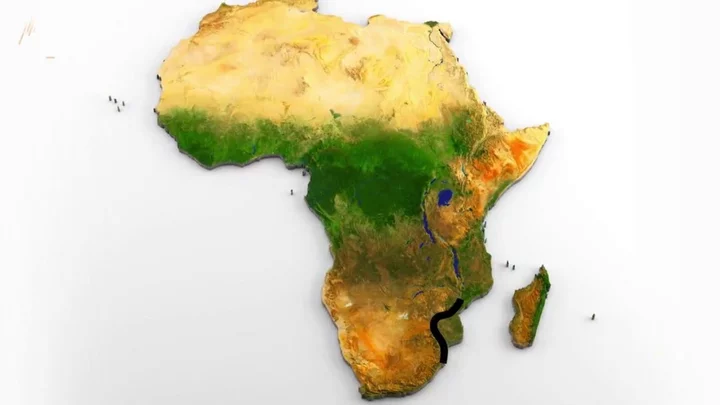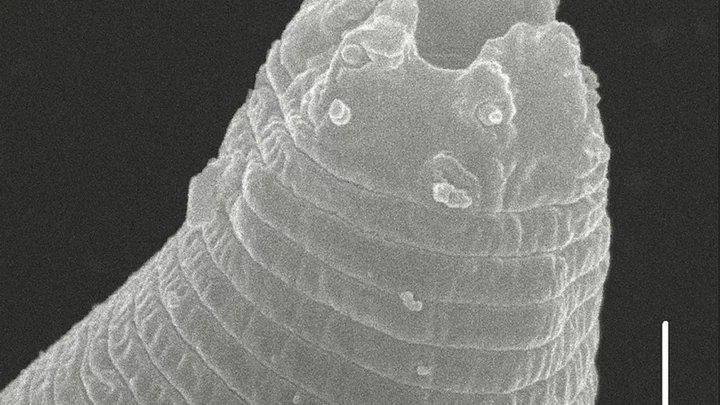
Musk draws heat from San Francisco over giant X logo
By Nicholas P. Brown A giant, glowing X marks the San Francisco spot where Elon Musk says he
2023-07-31 08:22

OceanGate founder now wants to send people to least hospitable planet in the galaxy
The co-founder of the OceanGate is now planning to send 1000 people to Venus despite the bad press the company has received following the doomed Titanic submersible trip in June which killed five people. Despite the tragedy, which saw the submersible implode killing everyone onboard, including the company's co-founder Stockton Rush, his colleague Guillermo Söhnlein is not deterred and has told Insider that he now has ambitions for space. According to Söhnlein he now wants to see 1000 people living on the surface of Venus, the hottest planet in the solar system, by 2050. The American businessman born in Argentina said: "I think it is less aspirational than putting a million people on the Martian surface by 2050. Sign up to our free Indy100 weekly newsletter "You're absolutely right that when you talk about going to Venus, it would raise eyebrows outside the space industry. And it even raises eyebrows inside the space industry." "I think I've been driven to help make humanity a multi-planet species since I was 11 years old, I had this recurring dream of being the commander of the first Martian colony." This all sounds well and good and after all Elon Musk has similar aspirations for Mars but Venus is an odd one as at this moment in time its one of the least hospitable planets in the galaxy. Aside from being the hottest planet in the solar system, as mentioned, its atmosphere is made up of greenhouse gases and its clouds contain sulphuric acid which make Venus so hot that temperatures can reach 475 °C. Regardless of this, Söhnlein thinks it is "very doable" that a floating space station could withstand the harsh conditions on Venus but will likely be met with skepticism. Söhnlein's Humans2Venus project has been co-founded with researcher Khalid Al-Ali and will strive to develop technologies that will reduce launch costs and fund space projects without government money. Have your say in our news democracy. Click the upvote icon at the top of the page to help raise this article through the indy100 rankings.
2023-07-30 16:15

New ocean discovered that is beginning to split Africa in two
Since the break up of Pangea that formed the world, we have been taught that there are seven oceans. But now, scientists believe a brand new ocean is currently forming as the continent of Africa is slowly beginning to split in half. Researchers have found two large parts of the land within Africa have begun to separate and it's believed a whole new ocean will form in the divide. Africa is the second-largest continent in the world, with a landmass of more than 30 million square kilometres, and is also the second-most populous. Many of its 54 countries are landlocked, however for some that could be about to change. Geologists believe countries such as Uganda and Zambia could come to have their own coastlines if the two land masses continue to separate. In the peer-reviewed journal, Geophysical Research Letters, experts have confirmed that the split in the African continent is creating a way for a new ocean to form. Sign up to our new free Indy100 weekly newsletter Scientists have identified the exact location where the continent first started to split, very deep underground. The crack first began to appear in 2005 in Ethopia’s deserts. The crack is known as the East African Rift and is 35 miles long. The start is positioned at the meeting point of three tectonic plates which have been gradually pulling apart from each other. Christopher Moore, a Ph.D. doctoral student at the University of Leeds, told NBC News: “This is the only place on Earth where you can study how continental rift becomes an oceanic rift.” Moore and other researchers have used satellite radar to monitor the volcanic activity in East Africa as this is associated with tectonic shifts. Despite being able to monitor movement, the split is a very gradual process, and scientists believe it will take another 5 to 10 million years for the new ocean to fully form. Have your say in our news democracy. Click the upvote icon at the top of the page to help raise this article through the indy100 rankings.
2023-07-29 23:57

Experts resurrect parasite after 46,000 years in Siberian permafrost
Scientists have resurrected a parasite which has been dormant in the frozen permafrost of Siberia for 46,000 years. The microscopic creatures were first uncovered as part of a remarkable discovery back in 2018. At the time, researchers led by Anastasia Shatilovich found two of the worms in sub-zero temperatures in the soil. At first, it was previously thought that the creatures could stay in their slumber for just 40 years. However, it was later revealed that they could stay inactive for tens of thousands of years. Sign up to our free Indy100 weekly newsletter The creatures tend to shut down their systems when they are in unfavourable conditions. This means they won’t move or reproduce, and their metabolism stops. Carbon analysis has revealed that the worms – also known as nematodes – came from a prehistoric era. The developments could change the way experts approach bringing back other extinct species, too. During an analysis, the research team discovered the worms were Panagrolaimus kolymaensis - a species that was previously thought to be extinct. The scientists wrote in their paper: “Previously, we had shown that nematodes from the Siberian permafrost with morphologies consistent with the genera Panagrolaimus and Plectus could be reanimated thousands of years after they had been frozen. “Several viable nematode individuals were found in two of the more than 300 studied samples of permafrost deposits spanning different ages and genesis.” It’s not the only thing that scientists have recovered from permafrost, either. It was announced earlier this year that scientists are busy working on reviving 'zombie viruses’ that have been lying dormant for tens of thousands of years in Arctic conditions, and while it sounds absolutely terrifying, it could be important when it comes to protecting us all in the future. Have your say in our news democracy. Click the upvote icon at the top of the page to help raise this article through the indy100 rankings.
2023-07-28 19:23

US Senate panel passes AM radio, ticket fee pricing bills
By David Shepardson and Diane Bartz WASHINGTON The U.S. Senate Commerce Committee approved legislation on Thursday to bar
2023-07-28 02:17

US Senator Wyden asks FTC, CISA, DOJ to 'take action' against Microsoft following hack
Oregon Senator Ron Wyden has asked the Federal Trade Commission, the Cybersecurity and Infrastructure Security Agency and the
2023-07-27 23:58

US senators Warren, Graham kick off bipartisan anti-Big Tech push
By Diane Bartz WASHINGTON U.S. senators Elizabeth Warren, a Democrat, and Lindsey Graham, a Republican, said on Thursday
2023-07-27 23:50

Scientists say people have the ability to 'smell' rain before it arrives
Ever wondered why people say they can smell rain before it rains? They are not pulling your leg - there is real science behind it. It is all because of petrichor, made up from the Greek words "petra", meaning stone, and '"ichor", which refers to the golden fluid that flows in the veins of the gods in their mythology. It basically means the the "smell of rain" with the phrase coined by Australian scientists Joy Bear and Richard Thomas in 1964. Jeff Weber, a meteorologist with the University Corporation for Atmospheric Research Unidata Program Center told the Mirror: "Petrichor is caused by oils derived from plants, primarily leaves, that accumulate over dry periods. These oils settle into soils or onto pavement over time and are released into the atmosphere by being disturbed by rainfall." According to the Met Office, the reason people claim to smell rain because it comes is because "when a higher humidity is experienced as a precursor to rain, the pores of rocks and soil become trapped with moisture forcing some of the oils to be released into the air". Sign up to our free Indy100 weekly newsletter Despite some being released before it actually rains, the strongest smell is released during. This is when raindrops landing on soil "trap tiny air bubbles on the surface which then shoot upward" and "burst out of the drop throwing aerosols of scent into the air where they are then distributed by the wind". The smell is produced by a soil bacteria which releases a chemical called geosmin, which provides an "earthy", musky or fresh aroma. Before it rains, a person might be able to smell the scent of ozone, or O3, which is a naturally present gas in the atmosphere which gets its name from the Greek word 'ozein', or smell. It sometimes indicate that a storm is on the way because pockets of gas are pushed down to ground level by winds. This means that those who are sensitive to the smells will likely be able to pick them up. So now you know. Have your say in our news democracy. Click the upvote icon at the top of the page to help raise this article through the indy100 rankings.
2023-07-27 23:23

Privacy group challenges Ryanair's use of facial recognition
DUBLIN Digital rights group NOYB on Thursday filed a complaint against Ryanair, alleging that the airline is violating
2023-07-27 18:30

Exclusive-Amazon has drawn thousands to try its AI service competing with Microsoft, Google
By Jeffrey Dastin (Reuters) -Amazon.com’s cloud division has drawn thousands of customers to try out its service vying with Microsoft
2023-07-27 00:54

TikTok to launch e-commerce program to bring Chinese goods to the US - source
By Josh Ye (Reuters) -TikTok plans to launch a program in August to help Chinese merchants sell goods globally, and
2023-07-26 17:16

Jack Ma-Backed Ant Plans Restructuring, Paving Way for HK IPO
Ant Group Co. is planning a restructuring that will break off some operations that aren’t core parts of
2023-07-26 10:58
